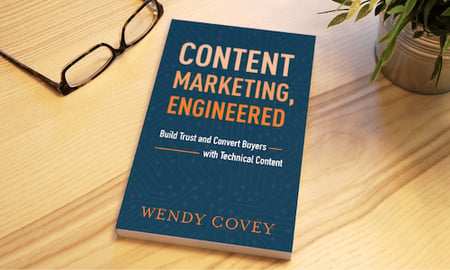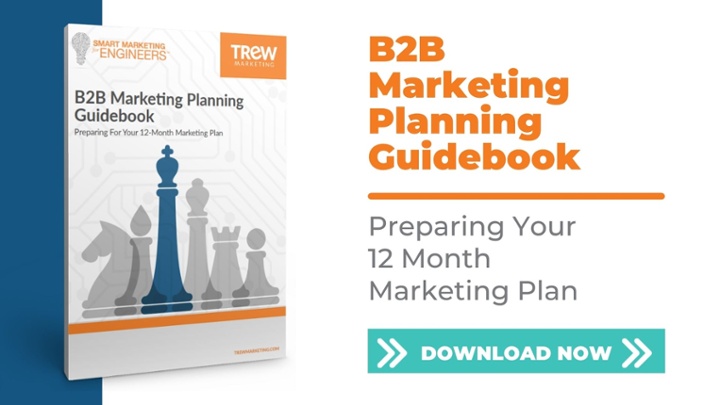6 min read
Choosing the Right B2B Marketing Team Structure: A Cost-Benefit Analysis
 Lee Chapman
:
9/15/20 10:00 AM
Lee Chapman
:
9/15/20 10:00 AM
The way you structure your B2B marketing team is a crucial decision that can greatly impact the success of your engineering company.

While each company organizes its marketing team based on its own unique culture, budget, and expected outcomes, there are three general approaches you can take:
- Do-It-Yourself (DIY)
- In-House Hire
- Outsource to a Technical Marketing Agency
Each has advantages and disadvantages to thoroughly evaluate before making the best choice for your company. In this post, we’ll walk through the pros, cons, and cost analysis of each option to help you decide which approach works best for you. In addition, we will discuss the benefits of a hybrid approach.
Choosing the Right Approach For Your B2B Marketing Team
Do-It-Yourself (DIY)
In small engineering companies, a few technical staff members often share marketing responsibilities. For instance, an R&D engineer may also fix the website and/or write code and content to update pages. A technical salesperson may be responsible for creating materials for a trade show in between customer visits and writing proposals.
Advantages
- No one knows your products and services better than you. By creating content yourself, you don’t have to waste time conveying that information to an outsider who may not be as familiar with your technology.
- With the technical competence of the engineering staff, it’s easy to perform tasks such as updating website code.
Disadvantages
- Any time spent on marketing takes a technical salesperson away from closing new business or takes a high-value engineering staff member, such as an R&D engineer, away from working on product development or billable client service delivery.
- A marketing professional can execute marketing activities faster, smarter, and more cost-effectively than an untrained, highly-compensated technical staff member.
Cost
A bare minimum inbound marketing program requires 15 to 20 hours per week to create one content piece per month, blog once a week, manage leads, support sales needs, improve SEO, update the website, and assess metrics.
You can roughly estimate your annual cost based on the income of the engineer or salesperson who executes the marketing activities. Using a salary of $90,000, that calculates to $33,750 to $45,000, not including the opportunity cost of that person’s time spent on closing business, developing products, or delivering to clients.
For this reason, the DIY approach can be quite expensive given an engineer’s salary and lost high-value productivity and revenue.
Hiring an In-House Marketing Specialist
If your company doesn’t have the bandwidth or expertise to carry out these marketing tasks in a consistent and timely fashion, you may need to bring on a marketing specialist.
Advantages
- Having a dedicated marketing resource at your company means that person will live and breathe your brand and have the bandwidth to execute the marketing plan.
- It’s easier for a dedicated, on-site marketing person to chase people down to get the materials, reviews, and approvals needed to complete activities.
- If your messaging, marketing strategy, or campaign plans are not well defined, you will save money with a fixed-salary in-house marketing person versus an outsourced resource because of the extensive time you’ll likely need for numerous reviews and back-and-forth iteration of activity execution.
Disadvantages
- B2B technical marketing is a unique niche that requires people with an aptitude and interest in topics that are considered boring or confusing (or both) to the average marketer. Be prepared to spend a lot of time and effort in the hiring and onboarding process to select and train your marketing specialists for success. If this process is rushed, they will quickly become demotivated and disengaged and leave six months later, sending you back to square one.
- One person will not have enough experience across all marketing disciplines to be able to take advantage of all the best marketing methods. Just as a mechanical engineer has limited electrical engineering knowledge, a marketer who has deep experience in SEO and web marketing may not be comfortable with company positioning or marketing strategy.
- Sometimes the marketing specialist can get commandeered by the sales department to help with its needs and start serving as a part-time sales coordinator, which compromises marketing goals and results.
Cost
The approximate salary of a marketing specialist ranges from $55,000 to $70,000, not including other benefits and taxes. That means this person is now on your payroll, rain or shine, so even if times are lean, be prepared to cover the costs of this overhead expense.
Word of Warning
You may be tempted to hire a “free” marketing intern, but remember, interns are looking for learning experiences and chances to grow their marketing skills. As students, they are much less experienced and require a marketing mentor to spend time guiding them. Be careful whom you choose as a mentor. Bad marketing not only delivers poor results but also damages your company’s reputation (think emails with spelling errors or inaccurate images). Engineers have little patience with poor quality.
Outsource to a B2B Marketing Agency
The third option is to outsource marketing to a team of experts with a special focus on targeting technical audiences. Marketing firms come in many flavors. Some focus on only one specialty (e.g., SEO, web design, PR, strategy, or brand), while others are full-service and cover all or most areas of inbound and/or outbound marketing. Some focus primarily on project execution while others tackle marketing from the top down: strategy first and then activities and tactics to follow. Because individual activities may need to change to support the overall strategy, a full-service firm with all the marketing tools at its fingertips can more easily take advantage of opportunities to best accomplish your business goals.
Advantages
- You have a team with years of marketing experience, so you can keep your engineering and sales staff focused on critical R&D, client delivery, and new business projects.
- Acting as one marketing team across all activities helps marketing team members become more efficient, consistent, and self-sufficient with time as they leverage what they’ve learned from each new project.
- By going with a team of marketing experts instead of a single marketing specialist, you get access to their breadth and depth of marketing and industry knowledge, but you pay for only the fraction of their time you need. Outsourced marketing features a variable cost: you pay for it only when you need it.
Disadvantages
- The outsourced marketing team members will need a ramp-up period as they learn about your company, so make sure to hire a firm that is comfortable working with engineers and is experienced with technology marketing.
- If you work at a large company or have established in-house marketing functions, you may want a specialized team with deep expertise in one channel or one that focuses on a specific initiative like a product launch.
Cost
Monthly costs for marketing services at SMB technical companies can range from $3,500 to over $20,000+ per month and are driven by the results you are seeking and how quickly you are seeking them. You can turn them off or down as lean times come and go. However, be aware that marketing is a long-term investment and not a one-time expense. To keep visitors coming in and leads converting, you must consistently build awareness, create and promote new content, and execute lead nurturing.
The Best of Both Worlds: A Hybrid Approach
Often, the ideal approach is a hybrid one that optimizes existing resources and areas of expertise (such as technical content development) and focuses outsourced efforts on marketing gaps.
For example:
- The outsourced marketing team manages the defined plan and objectives and helps with content plan development, while the internal marketing specialist executes marketing tasks such as emails, web changes, blog articles, and internal reviews and coordinates content development from internal engineers.
- The sales engineer makes first contact with the customer to request approval to write a case study or shoot a video testimonial, and then the outsourced marketing team takes the lead on writing or production.
In terms of internal team structure, as you grow beyond the DIY approach and become ready to hire your first internal marketing resource, I recommend your first hire be a marketing specialist.
I have seen growing technical businesses hire a senior-level marketing manager only to find they’re paying a high salary for the strategy and foundational work but still have to outsource all the execution. Or they hire a narrowly skilled role, such as a graphic designer, who is low in salary and high in management overhead. Instead, hire a marketing generalist with three to four years of experience and preferably a communications, advertising, or journalism degree. The specialist should oversee the time-intensive day-to-day management and coordination of content generation, reviews, and promotion; website updates and maintenance; SEO implementation on the blog and website and in new content; blog publishing; technical writing (e.g., case studies, top-level web pages, etc.); and your leads database, marketing automation, and lead nurturing. You can stretch your dollars far with highly motivated marketers who are interested in technology and are looking for autonomous roles that allow them to manage their workloads, be held accountable to expected outcomes, and be able to lean on an outsourced, experienced marketing team for strategy, specialized execution support, and mentorship.
From there, the next hires to consider for your marketing team may include a product, service, or segment marketing engineer to help with demos, technical content development, events, and sales support; a part- or full-time writer to develop all content using a journalistic approach to interview subject-matter experts for more technical pieces; and a marketing coordinator to help offload your growing marketing specialist, who may eventually be promotable to marketing manager.
Whichever approach you decide on, ensure you set your organization up for success with a documented, measurable, marketing plan. Learn how in our Guide to B2B Marketing Planning.
TREW is a marketing agency dedicated to reaching engineering and technical audiences through a range of marketing initiatives. Contact us today to learn more about the services we offer.
SUBSCRIBE TO OUR BLOG FOR THE LATEST UPDATES
Lee Chapman
 Lee guides agency strategy and performance, and she champions the ongoing pursuit of building a great marketing team. She has extensive B2B technical marketing experience across a spectrum of industries and application areas including test and measurement, control and automation, and industrial manufacturing. Her focus has always been on building lasting partnerships that connect marketing strategy to bottom line-business results. Lee lives in Austin, Texas where she is passionate about supporting organizations working to end homelessness and provide affordable housing in Central Texas.
Lee guides agency strategy and performance, and she champions the ongoing pursuit of building a great marketing team. She has extensive B2B technical marketing experience across a spectrum of industries and application areas including test and measurement, control and automation, and industrial manufacturing. Her focus has always been on building lasting partnerships that connect marketing strategy to bottom line-business results. Lee lives in Austin, Texas where she is passionate about supporting organizations working to end homelessness and provide affordable housing in Central Texas.
About TREW Marketing
TREW Marketing is a strategy-first content marketing agency serving B2B companies that target highly technical buyers. With deep experience in the design, embedded, measurement and automation, and software industries, TREW Marketing provides branding, marketing strategy, content development, and digital marketing services to help customers efficiently and effectively achieve business goals.






